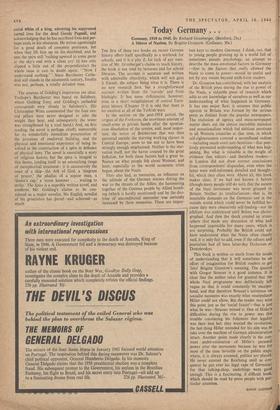Today Germany , . .
THE first of these two books on recent German history offers itself specifically as a textbook for schools, and it is a pity if, for lack of any men- tion of Mr. Grunberger's claims to teach history, the book is not used by lecturers and for school libraries. The account is accurate and written with admirable objectivity, which will not gain it friends, the subject being what it is. There is no new research here, but a straightforward account written from the 'outside' and from hindsight. It has some deficiencies, however; even in a short recapitulation of central Euro- pean history (Chapter 1) it is odd that there is no mention at all of the Turkish wars.
In the section on the post-1918 period, the origins of the Freikorps, the enormous amount of small-arms in private hands after the spontan- eous dissolution of the armies, and, most impor- tant, the terror of Bolshevism that was then universal outside the starving working classes in Central Europe, seem to me not to have been strongly enough emphasised. Neither is the star- vation itself, nor the havoc created by the great Inflation, for both these factors had a great in- fluence on what people felt about Weimar, and later, especially as the world economic crisis began, about the Nazis.
They also had, as memories, an influence on the attitude of the German masses during the war to the threats of the Allies; the hammering together of the German people by Allied bomb- ing (which is hardly mentioned) and by the doc- trine of unconditional surrender was certainly increased by these memories. These are impor-
tant keys to modern Germany. I think, too, that to young people growing up in a world full of sometimes pseudo psychology, an attempt to describe the mass emotional factors in Germany —that is, the factors that really allowed the Nazis to come to power—would be useful and not by any means beyond sixth-form readers.
Dr. Granzow has contributed, with her analysis of the British press during the rise to power of the Nazis, a valuable piece of research which adds to our knowledge of ourselves as well as our understanding of what happened in Germany. It has one major flaw; it assumes that public opinion in Britain was formed by the serious press as distinct from the popular newspapers. The exclusion of agency and mass-newspaper matter shuts out the almost incredible mistakes and sensationalism which fed dubious emotions in all Western countries at that time, in which self-righteousness covered a secondhand sadism —including much overt anti-Semitism—that posi- tively prevented understanding of what was hap- pening. But what is valuable is the weight of evidence that editors—and therefore readers— in London did not draw correct conclusions from correspondents' dispatches, even when the latter were well-informed, detailed and thought- ful, which they often were. Above all, this book makes clear, if we had not known it before (though many people still do not), that the nature of the Nazi movement was never grasped in Britain. Neither its totalitarianism—that is, its insatiable demands on the Germans and in the outside world which could never be fulfilled be- cause they were obsessively self-feeding—nor its nihilism was understood until Belsen was photo- graphed. And then the shock created an atmo- sphere that made any discussion of what had happened impossible for many years, which is not surprising. Probably the British could not have understood what the Nazis often clearly said, it is only fair to add, even if the editors and journalists had all been latter-day Dickenses or Dostoievskys.
This book is written so much from the inside of understanding that it will sometimes be an effort of imagination for British readers to get 'into' Brigitte Granzow's meaning. The quarrel with Gregor Strasser is a good instance. It is clear that the author takes for granted that the whole Nazi programme was deliberately left vague so that it could constantly be manipu- lated, and that therefore Strasser's insistence on socialist measures was exactly what manipulator Hitler could not allow. But the reader may miss this point just as the 'social fascist'—that is just what he was—Strasser missed it. One of Hitler's difficulties during the rise to power was this trouble convincing his followers that legality was their best bet; they wanted the revolution, the last thing Hitler intended for his aim was to take over the machine of German administration intact. Another point made clearly is the con- stant under-estimation of Hitler's personal power over the movement because he was for most of the time invisible on the public stage, where, it is always assumed, politics are-played. He never entered the Reichstag until as con- queror he put over his legal rape of Germany; for that talking-shop, ' underlings were good, enough. This is a fascinating, if difficult book, which should be read by press people with par- ticular attention.
SARAH GAINHAtvg






































 Previous page
Previous page